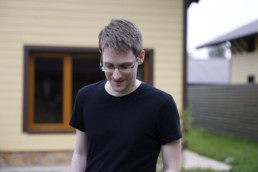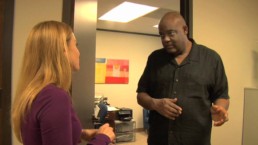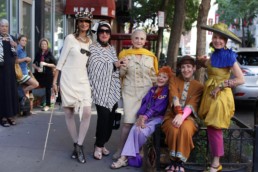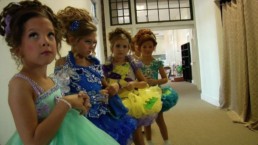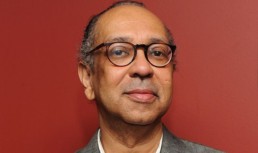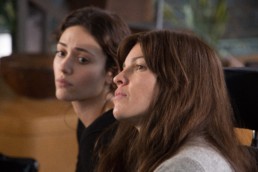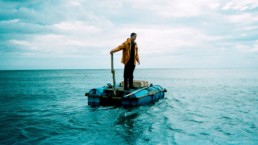Review: 'CitizenFour'
This screening was like every other; after the film ended I got my parking validated, grabbed a lollipop for the road and walked to my car. After leaving the parking structure, I turned on my phone and opened the Waze app. A message on the screen appeared, asking if I would like to go "Home." I hit "OK," and began following the directions. Then it dawned on me: I was leaving a screening about the total disillusion of privacy and here I was, putting out private information about where I was and where I was going. Although it was too late, I immediately closed the application, but the knots in my stomach remained. CitizenFour has that effect; its powerful and poignant story will leave you terrified, but on the same coin, it is absolutely stunning and fascinating. Before he was the infamous whistleblower, 29-year-old Edward Snowden, Ed (as he likes to be called), or CitizenFour (his online alias), was an infrastructure analyst at the NSA. In 2013, famed cinema verite director Laura Poitras documented, "A week in the life of Edward Snowden," which has now become her latest truth-bomb film, CitizenFour.
The burning question on our minds is simple, "Why?" Snowden tells the cameras from his hotel room in Hong Kong that it just hit him one day- while working at the NSA he realized he was getting paid to create ways to attain people's private information without their prior knowledge or consent. He couldn't believe this was the current operation standard and imagined a future where this type of "big brother" behavior would become more invasive. So he left; he took whatever documents he could to expose the truth about the government and its protocol. With the conscious intention not to put the country or citizens at risk, he took to the media. Speaking primarily to director Poitras and journalist Glenn Greenwald, Snowden raises alarming facts, like 300 million AT&T records a day are being monitored and drone feeds from abroad can be live streamed from the desktops at the NSA. New phones, like the one in the hotel room he is interviewed in, can actually be tapped into even when the receiver is down. Snowden literally unplugs the cord from the phone, saying, with the hint of a smile, it's the only way to ensure privacy. The information he shares is relayed from Greenwald to the major networks, claiming an "unidentified source" has proof of domestic intelligence abuse. For now, Snowden remains anonymous, but in a couple of days his identity is revealed, and obvious aftermath follows.
Laura Poitras took on a massive project when she set out to make CitizenFour, and she succeeds in capturing and unveiling this extraordinary moment in journalism that we, on the outside, never see.
To say this is just a "film" feels like a discredit to director Laura Poitras. It's hard to critique; there is no saying whether it is "good" or "bad," rather, it seems like an extraordinary glimpse into this secret world that must be seen, and not just by Americans. To this, I say the documentary is beyond expectations, a superior feet in cinema verite filmmaking. Poitras doesn't let the camera dictate the story, rather, she lets her subject be the only point of attention. She uses single long takes over voice overs to saturate the audience in the location while feeding us a bevy of information. An example of this can be seen in the film's trailer- Poitras narrates an email she received from Snowden while visually, we are staring into a black tunnel. This visual, mixed with those words, are beautifully haunting.
Snowden is extremely articulate and keeps a calm demeanor throughout the film despite the high stakes, and with a voice like Seth Rogen, he comes across as a likable guy. We feel like we are sitting on the bed next to him, experiencing the anxiety he feels. As the story unfolds, in real time Snowden is communicating with his girlfriend back in Hawaii who has no idea where he is or what he is doing. Keeping her in the dark was the only way to ensure her safety, and even though Snowden admits that he doesn't regret anything thus far, he does seem reclusive after hearing his house is being kept under surveillance.
Laura Poitras took on a massive project when she set out to make CitizenFour, and she succeeds in capturing and unveiling this extraordinary moment in journalism that we, on the outside, never see. Clearly, this film tells the story from a one-sided perspective but Poitras does her best to make a film that doesn't push a political agenda and just states the facts. And the fact is, privacy is gone.
The expectation of every American citizen is the right to freedom, however, the word "freedom" has morphed into the word "privacy." What was once the freedom to engage with the internet now comes with a price; it is virtually impossible to not leave a digital footprint everywhere. It's this reason why Edward Snowden reached out to Laura Poitras to tell his story, to bring awareness to this national and international story. In a sense, he gave up his life for the American public's best interest, and Poitras was there to capture it. If there is any one film worth catching this weekend, let alone this year, make sure it's CitizenFour.
https://www.youtube.com/watch?v=GiU2zinfotI
Review: 'The Overnighters'
What is the American Dream worth to you? Would you be willing to leave your current life behind by uprooting to a rural town in North Dakota for just a shot at gaining employment in some factory? For many Americans, unfortunately, they have no choice but to risk it all with no guarantee of a better future. It's a struggle that no one should experience, but as director Jesse Moss artfully captures in his documentary The Overnighters, this situation is all too familiar to many people. With help from Paster Jay Reinke, those who wander onto the doorstep of his church are given shelter, food, and much needed emotional support. Pastor Reinke's "Overnighters" program changed the lives of hundreds, however, the ultimate effect it had on the community was too much to bear. In a captivating story, Reinke and the overnighters face a harsh reality with dire consequences, as they discover that no good deed goes unpunished.
The town of Williston, North Dakota is the definition of a rural country community and the perfect visual companion to the desperation of the migrants. North Dakota, in general, isn't portrayed much in films, and it's not hard to see why this lone state is not the desired location for prospective projects, or people, for that matter. North Dakota attracts a wide spectrum of people hoping for their last shot, those who have struck out "back home" and are looking for a clean slate. Criminal history and sketchy pasts are overlooked by Pastor Reinke, who literally houses strangers in his family's home, which he shares with a wife and children. A naive move on his part, skeptical audience members (including myself) will find it extremely uncomfortable when the Pastor invites a registered sex offender to stay at his home. In his mind, he is living the word of God, but in the eyes of his neighbors, friends, and the community in general, he is one step away from a devastating outcome.
The motivational undertones make one want to invest the time to watch it- although it is hard to silently sit through Pastor Jay's naive actions without saying out loud, "Are you crazy?"
A timely film that shows the struggles men and women of all ages encounter trying to stay afloat in today's economy may hit pretty close to home, but this is a story about perseverance, not one looking for sympathy or a handout. The motivational undertones make one want to invest the time to watch it- although it is hard to silently sit through Pastor Jay's naive actions without saying out loud, "Are you crazy?"
Jesse Moss struck gold with this documentary; he tells the story that many people have experienced without exploitation or loss of dignity. To find a story this compelling in the tiny town of Williston is like finding a needle in a haystack, and while Moss does an excellent job with 95% of the film, it's the last 5% that really resonates with me. Without spoiling this unforeseen twist at the end, there is a loss of direction by trying to incorporate too many hot button topics into one film; the 'surprise ending' seemed forced and rushed. Though I can't take away its shock factor, nor doubt its credibility, however, I don't see how it helps propel the story that The Overnighters originally set to tell.
At the heart of the film, The Overnighters is not just about the nation's poor economy or the universal stereotype against the unemployed, rather, it is a film about humans and how our beliefs attempt to make the world and each other, better. With constant talk of how poor the economy is, and the hardships of the job market, it's clear that this film is an answer that serves as both entertaining and insightful about the current state of our nation from the perspective of those affected. The Overnighters has already screened in a variety of festivals and has taken home a slew of awards, including the Special Jury Prize at this year's Sundance Film Festival. This is one documentary not to be missed.
https://www.youtube.com/watch?v=S5ER9Yo5Bfg
Darryl Roberts on 'America The Beautiful 3'
From the very beginning of our talk, passion and enthusiasm illuminates from Darryl Roberts. Extremely articulate with the voice of a radio DJ, it is soon clear that this award-winning director has found his calling in the America The Beautiful documentary series, and we are talking about his third film which opens today, America The Beautiful 3: The Sexualization of Our Youth. He is known in the documentary world for making films about beauty and superficiality, and in this film, he specifically targets the media and its effect on society. Roberts is not making these films for just a paycheck, in fact it's quite the opposite. During our exclusive interview, he tells me his plans to screen the film for free to anyone who wants to see it, and hopes that Emma Watson will be among those in the film's audience. We begin:
I KNOW THIS IS THE THIRD INSTALLMENT IN YOUR DOCUMENTARY TRILOGY, BUT WHEN DID YOU FIRST BECOME INTERESTED IN THIS SUBJECT MATTER?
It started around October 2002, I was having dinner with a friend of mine at McDonald's in Chicago and we were just talking about women and beauty, and that kind of stuff. From that conversation, I realized that beauty played a large part in how we relate to other people, which is just shallow and superficial. I remember asking him, why does beauty have to play such a big part of attraction? Relationships would be much deeper if we could get past that. Why are we obsessed with beauty? And that question, 'Why are we so obsessed with beauty' is what made me do the first documentary.
IN YOUR APPROACH TO THIS THIRD FILM, HOW DID YOU DECIDE ON THE TOPIC OF THE SEXUALIZATION OF YOUTH?
The American Psychological Association released a report on the sexualization of girls, and they made a statement that this level of sexualization is creating a mental health crisis. My first thought was [disbelief], so I kept reading the report and they talked about depression, low self-esteem, and eating disorders. About two weeks after [I read the report], some guy at a university made this flyer called "Ten Ways To Get Away With Rape." He hung it in the bathrooms all over the campus of Miami University in Ohio, and initially [the administration] wouldn't do anything about it, and that's when I knew I wanted to do something. Things were getting out of hand.
EMBARRASSINGLY ENOUGH, IN COLLEGE, I WORKED AT AN ABERCROMBIE AND FITCH FOR A COUPLE OF WEEKS. I QUICKLY REALIZED IT WAS NOT THE TYPE OF WORK ENVIRONMENT I WANTED TO BE IN, AND I'M GRATEFUL YOU CALLED THEM OUT IN YOUR FILM.
This is what I want to tell people: We do have a voice. When you look at the protest that 17 year old Cali Linstrom did, Abercrombie now has reduced their sexualization in ads by 70%, they added larger sizes, and they're totally committed now to being a socially responsible company. I thought it was important to show that they could do it, because 10 years ago they were seen as the worst perpetrators of sexualizing young girls, and if they could change, then we have hope for society.
What we're doing now is throwing the parents into the child's world so they can see the culture in which their child is living in.
TOTALLY, IT'S ONE THING TO ACCOMPLISH MAKING A FILM, BUT IT'S ANOTHER THING TO SEE THE EFFECTS OF YOUR MOVIE SO QUICKLY MAKE THIS CULTURAL CHANGE. AS A FILMMAKER, YOU MUST BE REALLY PROUD.
I'm going to be honest with you, the commitment from Abercrombie [is huge], they're doing this big anti-bullying campaign and getting rid of the perfume in stores. Seeing that change in them, based on where they came from, was almost more gratifying than doing the movie itself.
OUT OF ANYONE IN THE WORLD, WHO WOULD YOU LIKE TO SEE THE FILM?
The actress, Emma Watson. She spoke at the U.N. three weeks ago. She did a campaign called "He For She," which is the [same message] I had with this film. I want men to watch it and start to get more of an understanding of what women go through and start becoming allies for women.
I HEARD THAT THE PRESIDENT OF MONTE NIDO, CAROLYN COSTIN, IS ALLOWING PEOPLE TO SEE THE FILM IN THEATERS FOR FREE BECAUSE THE MESSAGE IS SO IMPORTANT.
I was doing a regular theatrical tour and back in May, Carolyn and her husband saw the film. They asked me about the film's distribution [plan] and they told me they don't think people will go to the movies if it costs $12, so they were like, 'What if we made it so anybody who wanted to go, could go and it didn't cost them anything?' I thought that was a great idea so we made free premieres across the United States... 14 free screenings in the top 14 cities. I think their hunch is working because we're almost full in all of them.
HAS ANYTHING CHANGED IN YOUR LIFE SINCE MAKING THE FILM?
Before doing the film, I didn't realize how pervasive sexual assault and abuse towards women was; it's just not something I've ever personally been exposed to. One of the goals I have with this film is to use it to bridge parents and children. What I'm seeing is when parents bring their children to these screenings, they have these conversations afterwards that, without seeing the film, may have been too awkward and not have ever come up in conversation. What we're doing now is throwing the parents into the child's world so they can see the culture in which their child is living in.
Review: 'Advanced Style'
Those who are into fashion blogs probably know of Ari Seth Cohen, the genius behind Advanced Style Blog. This blog isn't the typical, "What I wore today," attention-seeking site that thrives off of the validation of strangers, rather Cohen turns his attention, and his lens, towards a different crowd, the elderly women of New York City. Women ages 60 and up are Cohen's models and inspirations; their street style being far more eclectic than the average senior citizen. In a brilliant move, Cohen takes his blog and, with help from director Lina Plioplyte, turns it into an even more colorful and joyous documentary, aptly titled, Advanced Style.
Ari is not your typical "fashion blogger." His fulfillment comes not from the latest trends or fashion week, but from the elderly women whom he photographs. These wild, wonderful women use the NYC streets as their own personal runways, it's no wonder why Ari is mesmerized by their glamour.
We laugh with them as they laugh at themselves, which makes for an all around fun movie.
In the film, we are introduced to, and spend time getting to know, seven women and their day-to-day routines. Some run their own vintage stores, others ride bicycles around town to get noticed. While their looks are quite unique, the one who cuts pieces of her red hair and uses it to make her own false eyelashes proves to be the most thrifty. We laugh with them as they laugh at themselves, which makes for an all around fun movie.
Since the Advanced Style blog began around four years ago, the handful of women Ari has captured all have unique stories and backgrounds, but there is one common thread running through them; their positive attitude and outlook on life. They explain that they dress the way they do because it makes them feel good; they are not dressing for anyone else but themselves. This feeling of empowerment will bring a smile to your face as they challenge the notion of getting older and look fabulous while doing so.
Advanced Style is non-offensive and when comparing it to other fashion documentaries it has the ability to hold its' own. Personally, I would be hard-pressed to find anything better than Bill Cunningham New York (which if you haven't seen, you must do so immediately), however Advanced Style does a fantastic job with its subjects and story. In an industry obsessed with youth, these women prove that being yourself is best way to live. What's life without a little glitz and glamour anyway?
https://www.youtube.com/watch?v=_oNGfUcS6IA
Review: 'America The Beautiful 3'
By now, we've become so immune to Miley Cyrus' crotch grabbing, pot smoking, and all around vulgar antics, that we shrug our shoulders in defeat. It's hard to believe that Cyrus is only 21 years old, and girls all over the world look up to her as a role model. In Award-winning director Darryl Roberts' America The Beautiful 3: The Sexualization of Our Youth, the third installment in the trilogy of documentary films detailing the effect of society on women today, he focuses on the old-fashioned theory, "sex sells," and the consequences it's having on our youth.
The timing of the film's release is perfect; ironically enough, it's Jennifer Lawrence who is quoted as saying, in the beginning of the movie, "Sex sells… and for some disgusting reason, young sex sells even more." Lawrence is at the center of the nude picture hacking scandal, which couldn’t be a better symbol of a society obsessed with celebrity, attention, and hypersexualization.
In no way does America The Beautiful 3 reinvent the wheel, but it is an important and eye-opening documentary that serves more as educational than entertainment.
This generation is growing up so fast, and a large proponent of the increasing dehumanization and debasing of women stems from the media. Roberts profiles the obvious, if not cliche, advertisers who abide by the "sex sells" theory, like Carl's Jr, American Apparel, and Pepsi. Overly explicit advertisements are no doubt a part of this world, and the television industry knows first hand just how lucrative sex can be.
Aside from the media influence, Roberts also talks to child beauty-pageant moms who are either oblivious to, or suppressing, the fact that these pageants are demoralizing and, in my opinion, just plain creepy. The facts presented in this film aren't necessarily new information, although presented in this condensed fashion, it makes the issue seem hopeless. Through various interviews from mature teenagers who protest against Abercrombie & Fitch for their customer "selectiveness," to grown women recalling the horrors of on-campus rape, it's clear that this crisis is not slowing down.
In no way does America The Beautiful 3 reinvent the wheel, but it is an important and eye-opening documentary that serves more as educational than entertainment. Nonetheless, it is worth the watch. Especially worth noting is the bombshell revelation at the end of the film that we definitely don't see coming. I also have to say bravo to the directing duo (and my friends) the DANIELS, whose commercial for Wheetabix made it into this documentary. Whether that's a good or bad thing is up for debate.
https://www.youtube.com/watch?v=oclf9bi9ZC8
George C. Wolfe on 'You're Not You'
George C. Wolfe is a very talented man. With deep roots working on Broadway as a playwright and director, Wolfe lends his directorial skills to the silver screen in the film You’re Not You, an emotional and uplifting story about the delicate bond of friendship. Starring Hilary Swank and Emmy Rossum, Wolfe tells me in our exclusive interview that he couldn’t have been happier with his cast. Their talent is “dazzling”, but it was their shared willingness to create and open reception to suggestions that made them the “perfect actors to work with.” What struck me hardest during our talk was Wolfe's theory about the power of music in film, and life in general. His answer is extremely interesting, and gave me a new perspective on the way we interpret music. We begin:
WHAT DREW YOU TO THIS FILM, YOU'RE NOT YOU?
One- that it was about two women, and two- that they found a depth and a meaning between each other that they couldn't achieve in other relationships. I loved that, and I just wanted to see what that was like. That's what intrigued me.
YOU'RE NOT YOU WAS BASED OFF OF A BOOK, WAS THERE ANYTHING THAT SCARED YOU ABOUT DIRECTING AN ADAPTATION?
No, I mean I'm involved in a project right now that's about a book- a very famous book that everybody loves, and I went through a period of intimidation, and then thought, 'Get the hell over it.' When you read a book, you dictate your journey with it. With a film, it's telling you how you will go on the journey. So you have to be liberated and say 'Thank you for this great source material and now I'm off on my journey.'
VERY TRUE. YOUR PREVIOUS FILM, NIGHTS IN RODANTHE, WAS BASED OFF OF A NICHOLAS SPARKS BOOK. DO YOU FIND COMFORT IN THESE ADAPTATIONS?
No, not really.
[Laugh]
I don't know, I do select material but certain things come along at interesting times in one's life. I don't have any rules necessarily. I feel like if I can understand something inside of the story, then I feel as though I can help illuminate it. Like I mentioned, I was just fascinated by this incredibly intimate and powerful relationship between these two women. There are other projects that I'm working on that will trigger something in my brain that I will want to explore, and that's how I choose projects- [based off] what intrigues me as a director and an artist.
YOU'RE NOT YOU IS A GREAT STORY, BUT WHAT REALLY MAKES THIS FILM SPECIAL IS THE CAST.
Totally.
Check out our review of You're Not You here
PERSONALLY, I THINK OF HILARY SWANK AS THIS STRONG, POWERFUL WOMAN. HER PAST FILMS HAVE DEPICTED HER AS SUCH. IN THIS FILM, SHE IS SO VULNERABLE AND WE SEE A NEW SIDE TO HER. DID YOU HELP HER WITH THIS CHARACTER DEVELOPMENT?
Hilary is incredibly smart, very gifted with great emotional reserve. She did a lot of her own journey but we evolved together through this intimate and lovely way. What directors do, and what I did, is bring perspective. What was interesting, as much work as she did in the physical transformation, I helped to craft where [Swank and Emmy Rossum] were in their evolution as friends. So yes, I worked very intimately with her, but I also don't want to take anything away from the work that she did. I was just making sure that the story that needs to be told, at any given moment, was being told.
DID YOU KNOW FROM THE MOMENT EMMY ROSSUM AUDITIONED THAT SHE WAS GOING TO BE CAST?
It was one of those things where, we saw a lot of women! It was a very attractive role for very obvious reasons. During the audition, in retrospect, a kind of chemistry began to evolve between me and her, a director-actor chemistry, and one of the things that's really fulfilling is to watch that chemistry grow and grow. I adore her as an actor and I love working with her. Like Hilary, she's dazzlingly skilled.
Between takes I would go up and give Hilary and Emmy notes and then instantaneously I would see [the change]. I would drop an idea and they would let that organically emerge from the scene as if it were their choice, and that's a lovely type of actor.
I feel like if I can understand something inside of the story, then I feel as though I can help illuminate it.
YOU ALSO HAVE QUITE A HISTORY IN THEATER...
Yes, I've done 14 Broadway shows and ran the Public Theater for 12 years. So yeah, I've done a few plays in my day.
DO YOU FIND THAT THERE IS A DIFFERENCE DIRECTING FOR THE STAGE VS DIRECTING FOR THE SCREEN?
I think it can change- less so from medium to medium, but more so from project to project. I directed the first Broadway production of Angels in America and it was this [unique] robustness. It was seven hours of theater, and was [heavy subject matter], so it required certain muscles of myself. Then I did a two-character play that was much smaller, not in terms of depth. So I have to figure out what skill set I have, as a director, is appropriate for these stories.
THE MUSIC IN THE FILM IS VERY ON-POINT, EVERY CUE HAD A PURPOSE. IS MUSIC IMPORTANT TO YOU?
Very important. Of those 14 Broadway shows, I would say about half of them were musicals. Music is a language. When you hear music, you instantly trust it and then a part of you surrenders. If somebody starts talking to you, we're trained as human beings to question it, but somehow when we hear music we instantly believe it. For me, when you're working as a script-teller, you want to use music a lot because it's another way to seduce an audience into going an emotional direction.
AMAZING, VERY TRUE! SO WHAT DO YOU HAVE COMING UP NEXT?
Oh boy, well I'm working on a couple of theater projects, one of which is a stage version of Black Orpheus, and I have a couple of film projects that… we'll see, hopefully! One of the projects that I'm very proud of is that I helped to create this museum called the National Center For Civil and Human Rights in Atlanta, GA. And I'm writing a couple new plays as well. So I'm busy right now, which is good.
Review: 'You're Not You'
Hilary Swank reconfirms her place amongst Academy Award-winning actors with her portrayal of a classical pianist turned ALS victim in the film You're Not You. Based off Michelle Wildgen's book of the same name, You're Not You is both comical and touching, heartfelt and quirky, and an excellent performance piece about the power of friendship.
The film has many layers that only prove more interesting as the story unfolds. It begins as any typical rom-com does; Kate (Swank) and her husband Evan (Josh Duhamel) are hosting a dinner party with their closest friends in their architecturally-stunning home when Kate is asked to play one of her infamous songs on the piano. Suddenly, her hand begins twitching abnormally, and the screen cuts to black. At this point, it's clear that this is not a romantic comedy, but something much more.
I, like most people, am used to seeing Swank as the epitome of the strong and independent woman, so to see her so vulnerable is unexpected and powerful.
If you've read the book, you know that Kate is diagnosed with ALS, or Lou Gehrig's Disease, and is no longer able to live independently or take care of herself. Because of her restrictions, she and her husband Evan hire Bec (Emmy Rossum, Shameless), a twenty-something college student who is more interested in partying than being productive, as her caretaker. She is the manic pixie dream girl of the hipster subculture, although her character is extremely cliche, especially in the beginning of the film. Thankfully, Rossum finds the happy medium with Bec and becomes tolerable, and then extremely likable.
The first act of the film is "iffy"- I wasn't sure what direction it was headed, but Swank's fantastic character development and performance elevates the film. I, like most people, am used to seeing Swank as the epitome of the strong and independent woman, so to see her so vulnerable is unexpected and powerful. The loss of her motor skills is hard to watch, especially as she tells Bec she has "So much on the inside, but nothing comes out."
The friendship Kate and Bec develop over the course of the movie is the driving force behind the laughs and the tears; emotionally, these women grow together and the impact of their relationship on both of their lives is relatable.
You're Not You is emotionally complex and gratifying; the more the characters develop, the more we become interested in and begin to care for them. Music is also a big part of these character's lives, so those who enjoy musical subtleties with purpose will enjoy those moments. Case in point, the use of Bon Iver's Wash. will give anyone chills.
Without spoiling the end, I have to give credit to director George C. Wolfe for his choice of endings. It is the perfect summation for a film that leaves you speechless. All things considered, You're Not You is a great piece of work from all actors involved, especially Hilary Swank, and will leave you more than satisfied.
https://www.youtube.com/watch?v=SE0m-N-b1VA
Review: 'For Those In Peril'
In this rural fishing community in Scotland, the ocean is master. Respect for the sea runs deep (no pun intended) as generation after generation pass down folklore of the "devil in the ocean" to their children. This omniscient figure is the catalyst for the independent film, For Those In Peril- a surreal, slow-burning story about coping with loss and the internal struggle of letting go and moving on.
This dark drama focuses on a small community in Scotland and their inability to cope with tragedy. After a mysterious accident at sea (that is never shown, but alluded to), a town mourns for the "presumed" deaths of their friends and loved ones. What can only be assumed as a boating accident gone awry- five men are considered dead. Aaron (George Mackay), the only survivor, doesn't remember the accident or its cause and faces community backlash and resentment for his survival. Only his mother Cathy (Kate Dickie) and his late brother's girlfriend (Nichola Burley) support him as Aaron believes his brother and the rest of the crew are somewhere out in the ocean just waiting to be rescued. This stress forces Aaron into an existential crisis, and on the brink of disaster.
[George Mackay's] performance as lone survivor Aaron is powerful and raw; his pain is felt with his every move and his boy-next-door looks captivate.
BAFTA award winning director Paul Wright brings to the screen a story about love and loss while creating this ominous entity that is the ocean. Wright brings a unique voice to the film; incorporating character's "home videos" as flashbacks and subtle touches of the "found footage" technique to cinematically shake the linear story up cinematically. The dialogue was rather unconventional as well- at times, Peril feels as if it's packaged like a news story as Wright relies heavily on interviews with the aforementioned b-roll to move the story along. It's different, but it works well with this type of film.
However, an interesting story is nothing without a talented cast, and George Mackay truly carries the weight of this film on his back. His performance as lone survivor Aaron is powerful and raw; his pain is felt with his every move and his boy-next-door looks captivate.
For Those In Peril won Best Picture at the 2013 Scotland BAFTA Awards, and George Mackay took home the best actor award, as he should have. A widespread release isn't set yet, but it is showing at smaller theaters and is definitely worth seeking out.
https://www.youtube.com/watch?v=801FZ1Vxpuk

